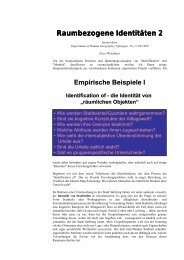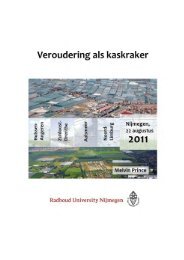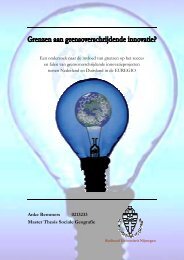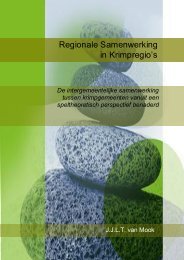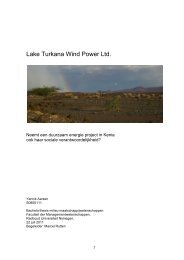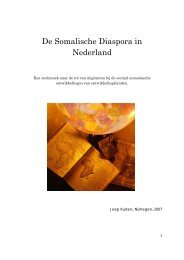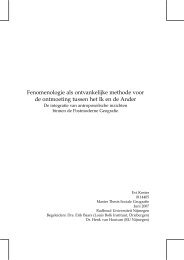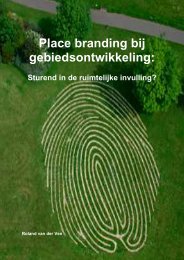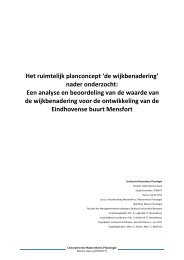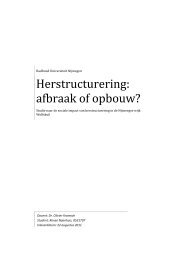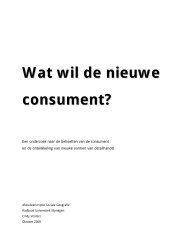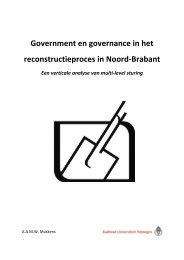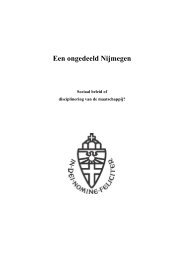Trading with the enemy in Mitrovica, Kosovo. - RUhosting
Trading with the enemy in Mitrovica, Kosovo. - RUhosting
Trading with the enemy in Mitrovica, Kosovo. - RUhosting
You also want an ePaper? Increase the reach of your titles
YUMPU automatically turns print PDFs into web optimized ePapers that Google loves.
Governmental Organisations (IGO's) as well as <strong>in</strong>dividual country-representatives or <strong>in</strong>ternational actors<br />
have made it <strong>in</strong>to one of <strong>the</strong>ir goals to make <strong>Kosovo</strong> a multi-ethnic society. <strong>Kosovo</strong> has been receiv<strong>in</strong>g about<br />
160 times <strong>the</strong> average yearly per capita aid of all o<strong>the</strong>r develop<strong>in</strong>g countries comb<strong>in</strong>ed (Mayr, 2008) <strong>with</strong> a<br />
large part of this aid aimed exactly at peace build<strong>in</strong>g programmes, but little progress has been made. <strong>Kosovo</strong><br />
is not becom<strong>in</strong>g multi-ethnic. As I am writ<strong>in</strong>g this <strong>the</strong>re are daily, violent protests of Serbs <strong>in</strong> North-<br />
<strong>Mitrovica</strong> aga<strong>in</strong>st Albanians reconstruct<strong>in</strong>g <strong>the</strong>ir houses <strong>in</strong> <strong>the</strong> same area 1<br />
. The NGO “CARE” (CARE,<br />
2006) found <strong>in</strong> a study <strong>in</strong>terview<strong>in</strong>g over 200 people <strong>in</strong> diverse communities <strong>in</strong> <strong>Kosovo</strong>, that <strong>the</strong>re is still no<br />
contact between Albanians and Serbs outside of organised NGO activities or pure necessity. Also, <strong>the</strong>re still<br />
is <strong>in</strong>ter-ethnic violence as well as <strong>in</strong>tra-ethnic violence aga<strong>in</strong>st people hav<strong>in</strong>g contact <strong>with</strong> “<strong>the</strong> o<strong>the</strong>r” tak<strong>in</strong>g<br />
place. On top of all evidence po<strong>in</strong>t<strong>in</strong>g to <strong>the</strong> <strong>in</strong>effectiveness of <strong>the</strong>se reconciliation efforts, <strong>the</strong> local<br />
population has grown hostile towards <strong>the</strong>m. They see <strong>the</strong>se efforts or reconciliation programmes as a waste<br />
of money and feel "forced" <strong>in</strong>to lik<strong>in</strong>g <strong>the</strong>ir former enemies. If this study would f<strong>in</strong>d that <strong>the</strong>re are <strong>in</strong>dicators<br />
that <strong>in</strong>ter-ethnic trade might improve relations between Albanians and Serbs, this <strong>in</strong>formation could be used<br />
to create policy measures. Policies that can perhaps improve relations not <strong>in</strong> <strong>the</strong> form of <strong>the</strong> highly unpopular<br />
reconciliation programmes but <strong>in</strong> <strong>the</strong> form of economic development: kill<strong>in</strong>g two birds <strong>with</strong> one stone.<br />
This <strong>the</strong>sis focuses on <strong>in</strong>ter-ethnic trade <strong>in</strong> <strong>Mitrovica</strong> to explore its effects on <strong>in</strong>tergroup relations between<br />
Albanians and Serbs. The hypo<strong>the</strong>sis is that trade can <strong>in</strong> some but not all cases lead to better <strong>in</strong>dividual<br />
relations between Albanians and Serbs. On a group level <strong>in</strong>ter-ethnic trade can make <strong>the</strong> groups more<br />
dependent of each o<strong>the</strong>r, decreas<strong>in</strong>g <strong>the</strong> possibly of violent confrontation. This trade might help relax <strong>the</strong><br />
“<strong>the</strong> rules of <strong>the</strong> <strong>in</strong>ter-ethnic game” which currently forbid any form of <strong>in</strong>ter-ethnic contact - except for<br />
economic reasons.<br />
1.1. Research Purpose - Topic / <strong>the</strong>sis question<br />
Inter-ethnic trade <strong>in</strong> <strong>Mitrovica</strong> and its effects on relations between Albanians and Serbs is <strong>the</strong> topic of this<br />
<strong>the</strong>sis. The past 30 years relations between Albanians and Serbs <strong>in</strong> <strong>Kosovo</strong> have been deteriorat<strong>in</strong>g, result<strong>in</strong>g<br />
<strong>in</strong> a civil war between 1998 and 1999. The <strong>in</strong>ternational community presence <strong>in</strong> <strong>Kosovo</strong> s<strong>in</strong>ce <strong>the</strong> end of <strong>the</strong><br />
conflict has been struggl<strong>in</strong>g <strong>with</strong> improv<strong>in</strong>g <strong>the</strong> relations between <strong>the</strong>se two ethnic groups – to no avail. The<br />
groups are completely segregated and <strong>the</strong>re is virtually no contact between members of <strong>the</strong>se groups. An<br />
exception this happens when <strong>the</strong>re is economic <strong>in</strong>terest. Because of this economic <strong>in</strong>terest especially trade<br />
between Albanians and Serbs is bloom<strong>in</strong>g. The central question of this <strong>the</strong>sis is if this trade can this lead to<br />
better relations between Albanians and Serbs <strong>in</strong> <strong>Mitrovica</strong>, <strong>the</strong> most divided city of <strong>Kosovo</strong>.<br />
1 B92. Visited on 07-05-2009<br />
http://www.b92.net/eng/news/politics-article.php?yyyy=2009&mm=05&dd=06&nav_id=58959<br />
6



